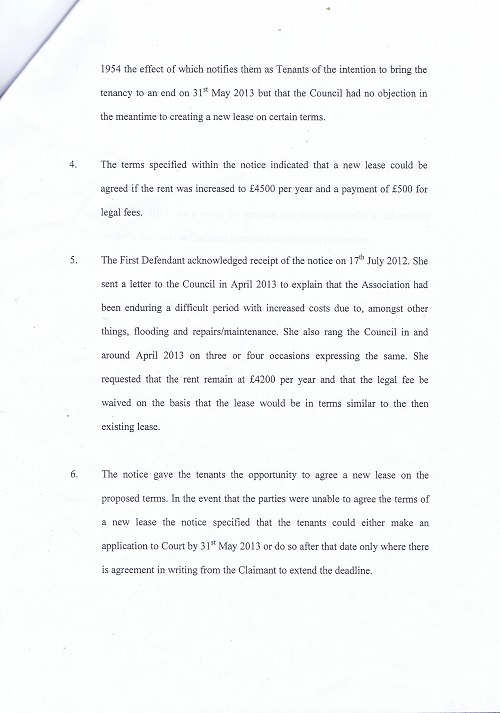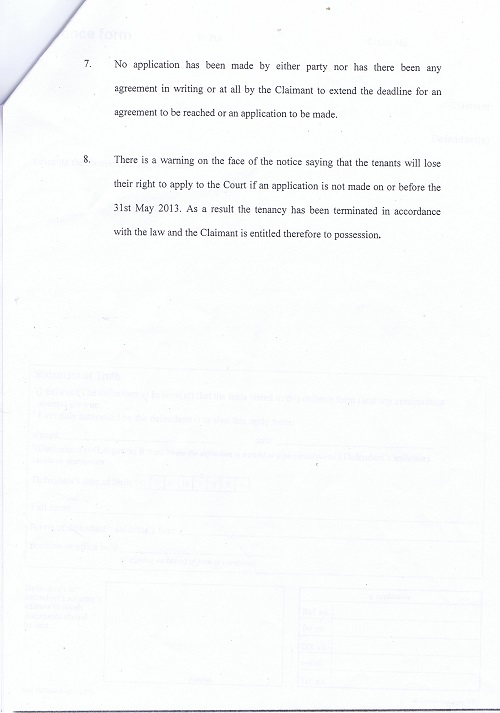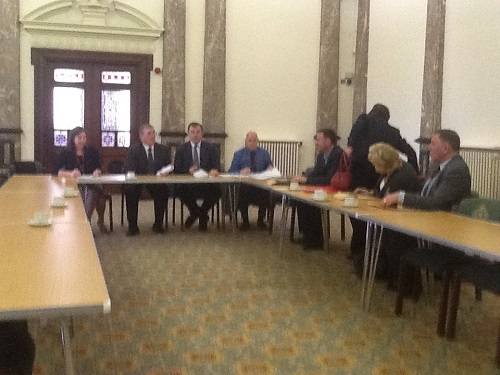Wirral Council: It’s time for some answers over Fernbank Farm and filming!
Particulars of Claim Wirral Council v Kane & Woodley Page 1 of 3
Particulars of Claim Wirral Council v Kane & Woodley Page 2 of 3
Particulars of Claim Wirral Council v Kane & Woodley Page 3 of 3
Jenmaleo
134 Boundary Road
Bidston
Wirral
CH43 7PH
9th June 2014
Surjit Tour
Monitoring Officer
Wallasey Town Hall
Brighton Street
Wallasey
Wirral
CH44 8ED
Dear Mr. Surjit Tour,
You are designated as the Monitoring Officer for Wirral Metropolitan Borough Council. Section 5(2)(a) and 5(2B) of the Local Government and Housing Act 1989 state the following about a legal duty of the Monitoring Officer:
Subject to subsection (2B), it shall be the duty of a relevant authority’s monitoring officer, if it at any time appears to him that any proposal, decision or omission by the authority, by any committee, or sub-committee of the authority, by any person holding any office or employment under the authority or by any joint committee on which the authority are represented constitutes, has given rise to or is likely to or would give rise to—
(a) a contravention by the authority, by any committee, or sub-committee of the authority, by any person holding any office or employment under the authority or by any such joint committee of any enactment or rule of law or of any code of practice made or approved by or under any enactment; or
(b) any such maladministration or injustice as is mentioned in Part III of the Local Government Act 1974 (Local Commissioners) or Part II of the Local Government (Scotland) Act 1975 (which makes corresponding provision for Scotland),to prepare a report to the authority with respect to that proposal, decision or omission.
to prepare a report to the authority with respect to that proposal, decision or omission.
(2B) Where a relevant authority are operating executive arrangements, the monitoring officer of the relevant authority shall not make a report under subsection (2) in respect of any proposal, decision or omission unless it is a proposal, decision or omission made otherwise than by or on behalf of the relevant authority’s executive.
On Friday 6th June the Chair of the Licensing Act 2003 subcommitee Councillor Steve Niblock insisted that I stop filming a public meeting of the Licensing Act 2003 subcommittee. The legal adviser to that committee insisted that he was entitled to take this action because of Regulation 25 of the Licensing Act 2003 (Hearings) Regulations 2005. This regulation is below:
“Procedure at hearing
25. The authority may require any person attending the hearing who in their opinion is behaving in a disruptive manner to leave the hearing and may—
(a) refuse to permit that person to return, or
(b) permit him to return only on such conditions as the authority may specify,
but such a person may, before the end of the hearing, submit to the authority in writing any information which they would have been entitled to give orally had they not been required to leave.”
“authority” in this context is defined in Regulation 2 as “in relation to a hearing, the relevant licensing authority which has the duty under the Act to hold the hearing which expression includes the licensing committee or licensing sub-committee discharging the function of holding the hearing;”
At no point during the meeting was I asked to leave the room by the Chair or the subcommittee as a whole. Regulation 2 which defines authority makes is clear that persons can only be required to leave if it is the opinion of the whole subcommittee that the person/s are behaving in a disruptive manner. There were two members of the subcommittee Councillor Harry Smith and Councillor John Salter who did not express a view, therefore Regulation 25 was not engaged.
The legal adviser to that committee, Ken Abraham said, “We have rights under the regulations too, which empower them to stop a hearing proceeding if there is an issue about disrupting the meeting and the Chair took the view at that time that because it was clearly indicated that he didn’t want filming that he could have asked you to leave the room but he didn’t.” As you can see from this quote, he refers to the Chair (Councillor Steve Niblock)’s view, not the view of the whole subcommittee. It is unknown whether the other two members of the subcommittee agreed with this view or held a contrary view as they did not state their view during the meeting on this matter.
S. 6(1) of the Human Rights Act 1998 states “It is unlawful for a public authority to act in a way which is incompatible with a Convention right.” and s.3(1) states “So far as it is possible to do so, primary legislation and subordinate legislation must be read and given effect in a way which is compatible with the Convention rights.”
The Convention Right in question is article 10 which is below:
“
ARTICLE 10
Freedom of expression
1. Everyone has the right to freedom of expression. This right shall include freedom to hold opinions and to receive and impart information and ideas without interference by public authority
and regardless of frontiers. This Article shall not prevent States from requiring the licensing of broadcasting, television or cinema enterprises.
2. The exercise of these freedoms, since it carries with it duties and responsibilities, may be subject to such formalities, conditions, restrictions or penalties as are prescribed by law and
are necessary in a democratic society, in the interests of national security, territorial integrity or public safety, for the prevention of disorder or crime, for the protection of health or morals, for
the protection of the reputation or rights of others, for preventing the disclosure of information received in confidence, or for maintaining the authority and impartiality of the judiciary.”
Bearing the above in mind and your previous email of the 2nd April 2013 in which you stated “Furthermore, there no ban on filming” I would ask you to exercise your duty as Monitoring Officer to prepare a report about the above matter.
There is also another matter which I wish to draw to your attention, which may place a duty on you to write a further report about a different matter. I am sure you are aware of Wirral Council’s successful attempt to gain a possession order for the land known as Fernbank Farm in Moreton.
Section 3 of Wirral Council’s Particulars of Claim stated “On 13th July 2012 the First and Second Defendants were served with a notice in the prescribed form persuant to section 25 of the Landlord and Tenant Act the effect of which notifies them as Tenants of the intention to bring the tenancy to an end on 31st May 2013 but that the Council had no objection in the meantime to creating a new lease on certain terms.” and Section 8 of the Particulars of Claim stated “As a result the tenancy has been terminated in accordance with the law and the Claimant is therefore entitled to possession.”
At the fast track trial on 13th February 2014, Wirral Council’s expert witness David Dickinson stated (under oath) that he had been instructed by a manager not to renew the lease. In answer to District Judge Woodburn’s question to David Dickinson that his instructions were contrary to the terms of the notice, Mr Dickinson answered that his instructions were contrary to the notice. In answer to another question Mr Dickinson answered that he had been told not to engage in discussions with the tenants between November 2012 and May 2013.
Regulation 3 of The Landlord and Tenant Act 1954, Part 2 (Notices) Regulations 2004 prescribe which type of form should be used. Wirral Council used form 1 and the prescribed purpose for form 1 is defined in Schedule 1 as “Ending a tenancy to which Part 2 of the Act applies, where the landlord is not opposed to the grant of a new tenancy (notice under section 25 of the Act).”
Based on David Dickinson’s testimony under oath, Wirral Council had decided not to renew the tenancy therefore form 2 should have been used, the prescribed purpose for form 2 is defined in Schedule 1 as “Ending a tenancy to which Part 2 of the Act applies, where—
(a)the landlord is opposed to the grant of a new tenancy (notice under section 25 of the Act); and
(b)the tenant is not entitled under the 1967 Act to buy the freehold or an extended lease..”
Clearly either a number of assertions (as outlined above) made in the particulars of claim are incorrect and Mr. Dickinson was telling the truth about Wirral Council’s decision not to renew the lease or alternatively what was outlined in the particulars of claim was correct and Mr. Dickinson was not telling the truth under oath. I am sure you will understand that the possibility of either scenario is concerning.
Therefore bearing in mind the above I would request that you write a further report on this matter which is your legal duty as Monitoring Officer. In order to aid you in this, I do know that following a complaint made by one of the tenant’s spouses that a long multi-page letter was sent to him about this and other related matters.
If a report (or reports) have already been written by yourself (or others on your behalf) I would appreciate being sent a copy. If a report (or reports) on these matters are in the process of being written by someone either at Wirral Council or an external third party I would appreciate being told who they are and by what date their report is expected to be completed.
If you feel a report (or reports) on the above matters are not necessary, I would appreciate hearing from you your reasons as to why. I intend to publish any such reply I receive either from yourself (or others on your behalf) as I feel that both these matters are of concern to large numbers of citizens on the Wirral and need to be resolved.
Yours sincerely,
John Brace
If you click on any of the buttons below, you’ll be doing me a favour by sharing this with other people.



